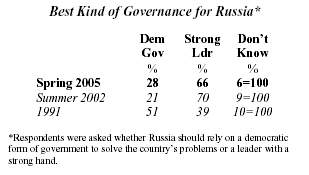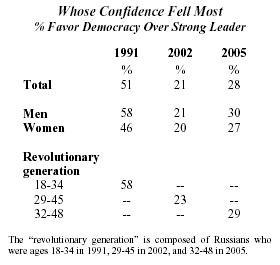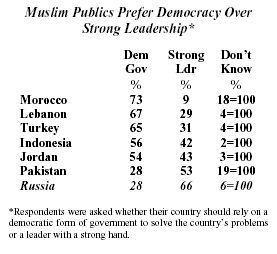Summary of Findings
Public opinion is tracking political developments in Russia. Russians have been considerably less enthusiastic about democracy in recent years than they were in the early 1990s. Today, unlike then, when public cries for freedom were leading to the collapse of the Soviet Union, a majority believes that their country would be better served by a strong leader rather than a democratic government. And the latest Pew Global Attitudes poll finds the Russian people would choose a strong economy over a good democracy by a margin of almost six to one.

These findings can only add to Western concerns that, under the government of President Vladimir Putin, democracy is in retreat in Russia. Recent passage of a law clamping down on foreign nongovernmental organizations and foundations operating in Russia and the resignation of a top economic adviser to Putin, Andrei Illarionov, who had earlier charged that Russia “is no longer a democratic country,” have focused world attention on the prospects for democracy there.
The climate of opinion was different in the fall of 1991, the Russians were discarding communism and hoped for a democratic future. The landmark 1991 Pulse of Europe survey, conducted by the Times Mirror Center (the predecessor of the Pew Research Center for the People and the Press), revealed a Russia ready to join the wave of democratization that had swept across Eastern Europe over the previous two years.
Today, however, nearly a decade and a half since the Soviet Union’s collapse and six years into the Putin era, many Russians are disillusioned. In 1991, by a 51%-39% margin, Russians believed their country should rely on a democratic government rather than a strong leader to solve the country’s problems. By 2002, the share choosing democratic government had fallen to 21%. Although it has since risen slightly, confidence remains low, with only 28% of Russians in our 2005 survey saying the country’s problems can best be solved by democracy.
Democracy Lost Most Ground Among Men and the “Revolutionary Generation”
The decline in enthusiasm for Russian democracy has been particularly steep among men. Even in 1991, when support for democracy was relatively high, a significant gender gap existed on the question of whether democracy or a strong leader could solve the country’s problems—men overwhelmingly chose a democratic government (58%- 35%), while women favored democracy by only a narrow four-point margin (46%-42%). Fourteen years later, that gap had virtually disappeared. Now, equal proportions of men (66%) and women (65%) think the country should rely on a leader with a strong hand.

Notably, the initial passion for democracy has declined sharply among those who were young when the Soviet Union collapsed. At that time, 58% of 18-34 year-olds preferred a democratic government over a strong leader. Today, as this “revolutionary generation” of Russians approaches or progresses through middle-age, the post-communist era has eroded their youthful enthusiasm: now those who favor a strong leader outnumber the fans of democracy by a 66%-29% margin.
Russian disillusionment with democracy may be tied to the country’s inability to meet high expectations created in the wake of the Soviet regime’s collapse. Although the economy has grown impressively since the economic downturn of the late 1990s, many Russians are frustrated by a lack of progress (today only 23% are satisfied with the way things are going in their country) and by what they perceive as growing economic inequality. In the 2002 Pew Global Attitudes survey, 92% of Russians said the gap between rich and poor had worsened over the preceding five years.
By the same token, democracy finds its stronger adherents among those Russians who have benefited financially from the transition to capitalism. Among Russians earning more than 8,000 rubles per month, 34% say democracy can solve the country’s problems, compared with 27% of those making 4,000-8,000 rubles per month and 21% of those with monthly incomes of less than 4,000 rubles.
More Confidence in Democracy in the Muslim World

This erosion of Russian support for democracy is even more striking when contrasted with trends in much of the Muslim world. In five of six predominantly Muslim countries, majorities give democracy priority over a strong leader. The exception is Pakistan, where 28% prefer democratic governance, the same level as in Russia. (It should be noted, however, that only 53% of Pakistanis choose strong leadership, compared with 66% of Russians, while the percentage offering no opinion is much higher in Pakistan.)
Prosperity Trumps Democracy
By an overwhelming 81%-14% margin, Russians say a strong economy is more important than a good democracy. The desire for a healthy economy is strong and consistent across all segments of Russian society—men and women, young and old, and every socioeconomic subgroup agree that, if forced to choose, they would pick prosperity over democracy.

Of course, Russia is far from alone in the priority it gives to a vibrant economy; even in countries where confidence in democracy is strong, the desire for economic well-being is stronger. Majorities or pluralities in eight of the nine countries in which this question was asked say the economy is a more important priority than democracy (Morocco is the only exception). This includes India, which has been a functioning democracy for more than half a century. Indeed, Indians are now closely divided over the relative merits of democracy and prosperity, a significant change from 2002 when they favored democracy by a 56%- 31% margin.




